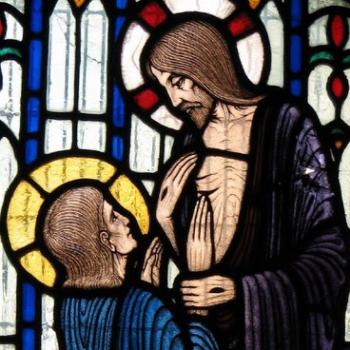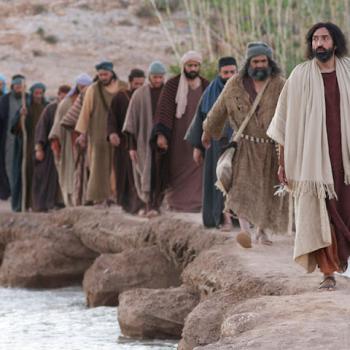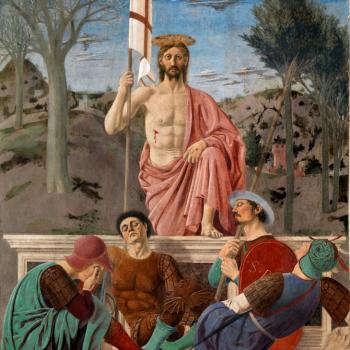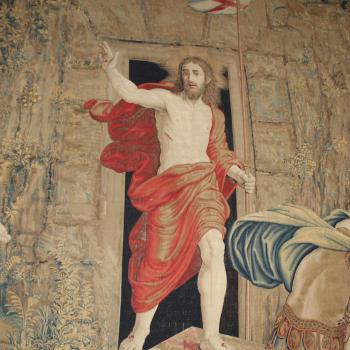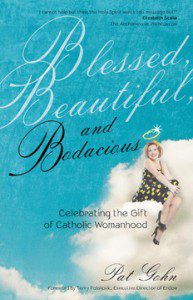 Pat Gohn’s Blessed, Beautiful, and Bodacious is a hymn to Mary of Nazareth, the mother of Jesus. She is, according to Gohn, a model for faithful womanhood and I would also suggest a fallible icon for personhood, for males and females alike. With my description of Mary as a “fallible icon,” I am not diminishing her importance, but actually enhancing her role as a guide for our own spiritual journeys. As a Protestant, for whom the importance of Mary as a spiritual figure is a relatively recent discovery, I have come to see Mary’s spiritual journey as an invitation to our own spiritual adventures. Mary represents one vision of what some are calling the sacred feminine, the feminine aspect of the universe and the divine, essential to spiritual wholeness for women and men alike.
Pat Gohn’s Blessed, Beautiful, and Bodacious is a hymn to Mary of Nazareth, the mother of Jesus. She is, according to Gohn, a model for faithful womanhood and I would also suggest a fallible icon for personhood, for males and females alike. With my description of Mary as a “fallible icon,” I am not diminishing her importance, but actually enhancing her role as a guide for our own spiritual journeys. As a Protestant, for whom the importance of Mary as a spiritual figure is a relatively recent discovery, I have come to see Mary’s spiritual journey as an invitation to our own spiritual adventures. Mary represents one vision of what some are calling the sacred feminine, the feminine aspect of the universe and the divine, essential to spiritual wholeness for women and men alike.
I must admit that I have a great difficulty with the metaphysics of Mary – her perpetual virginity, her “assumption” into heaven prior to her death, and her immaculate conception. These images are grounded in a theology for which sexuality and embodiment, even mortality, are problematic. A more human Mary, who gave birth to other children, experienced the imperfections of life, and trusted her living and dying to God, is a fallible but significant guide to human spirituality, indeed, a mortal human fully open in all her limitations to God’s invitations to partnership in birthing beauty. As such, she is one of us and an invitation to birth beauty ourselves.
Scripture suggests that Mary had other children, at least two of which were males. (Matthew 12:46-49) It also suggests that Mary on occasion, like most parents, often did not fully understand her own son. She was neither omniscient or infallible as a person or parent, and neither are we! This doesn’t diminish her, but presents her as a person who followed God’s way in all the complexities and imperfections of life. The fact that Mary and Joseph were whole persons, who bore children in the good old fashioned way, in no way detracts from her blessedness and nearness to God. Anything less than a whole-bodied Mary renders our own sexuality and domestic lives superfluous and an impediment to our relationship with God.
In my reflections on Mary, inspired by Gohn’s book, I want to focus on one snapshot from her life: the legend of the Annunciation. Whether or not this event happened as narrated, it is nevertheless true as a portrait of spiritual openness to God. Mary is one of us and her greatest virtue is her willingness to say “yes” with all her feelings of perplexity to God’s call. As the story goes, Mary is going about her business, when she is confronted by an angelic visitor with an outrageous, life-changing request – the call to become the mother of a world-shaper, God’s beloved messenger to humankind.
In her encounter with Gabriel, Mary is open to mystery and possibility. She recognizes that she has no particular qualifications for the task: she probably wonders why another young woman wasn’t asked, and – indeed – perhaps Mary wasn’t God’s only choice. But, Mary does something essential to following God’s vision: she says “yes” and on that yes, the future of humankind depends.
Mary’s yes is concrete, historical, and political. She is not one of the rich, famous, or powerful. She is, by her own admission, of “low estate,” a teenage girl from the working classes. She is a citizen of an oppressed nation. Still, she recognizes that God’s revelations – divine incarnations – are surprising, unexpected, and often unlikely. Yesterday, we might suspect, she was gossiping with girlfriends and making marriage plans. Today, she is a bearer of divine revelation.
And, with that revelation, she discovers that her child will be an agent of divine justice and hospitality, who turns typical social and political values upside down.
Mary is an invitation for us to say “yes” to life and to God’s visions for us. Mary is beloved, beautiful, and bodacious, and so are we. Mary is “every woman” and an invitation for “every man” to open to the wisdom of God where he finds himself. We are all – male and female – beloved by God, given a beautiful spirit, and invited on bodacious adventures as God’s companions in healing the Earth. While we may not be invited to give birth to a world-shaper, a savior, we are invited to give birth to divinity in our everyday lives. We are invited to bring forth beauty and justice and love.
I believe that Mary had agency. She could have said “no” to her angelic visitor. Instead, she said “yes” even though it is clear that she had little idea of what that yes might mean for her future and the future of her child. We too have agency in relationship to God’s moment by moment visitations in our lives. We can turn away from possibility; we can choose alienation over love; we can choose safety over adventure. Our choices make a difference in our futures and the futures of those around us, and when we say “yes” to God’s possibilities, we open the door to greater energy, insight, and wonder.
Mary says “yes” and this “yes,” more than any doctrinal assertions regarding sexuality, sin, or immortality, is what makes Mary special. On her “yes” and ours, the future depends. Will we choose the pathways of life for our relationships, for little children and their parents, for economic justice, and Earth care? Will we share in God’s world-shaping vision in our time and place? Will we with Mary embrace the divine “yes” upon which the world depends? When we do, whether we are male or female, will find discover our lives to be beautiful, beloved, and bodacious.




